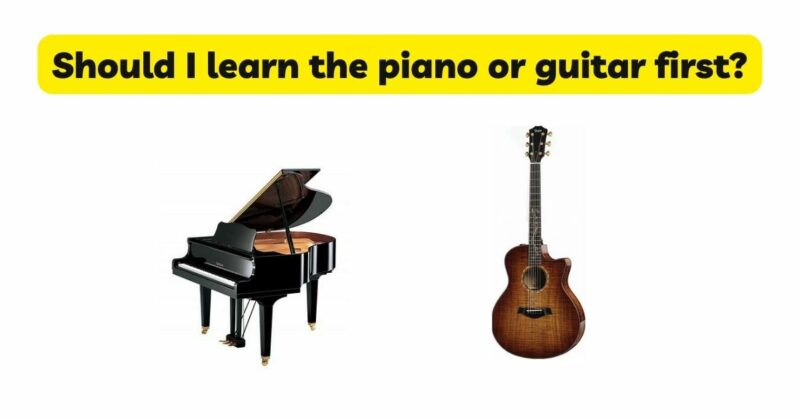Embarking on a musical journey is an exciting endeavor, and choosing the right instrument to start with can set the tone for your musical development. The piano and guitar are both popular choices for beginners, each offering its unique advantages and learning experiences. In this article, we will explore the factors to consider when deciding whether to learn the piano or guitar as your first instrument. We will delve into the benefits of each instrument, their learning curves, musical foundations, and personal preferences. By examining these aspects, readers can make an informed decision that aligns with their musical goals and learning style.
- Learning Curves: Piano’s Technical Foundation and Guitar’s Accessibility: The learning curves of the piano and guitar differ, and this can influence the decision of which instrument to start with. The piano demands precise finger coordination, hand independence, and an understanding of music theory and notation. It provides a solid foundation in music fundamentals, such as reading sheet music, understanding rhythm, and developing finger dexterity. The guitar, on the other hand, is often perceived as more accessible for beginners due to its intuitive nature and simpler visual representation. Chord-based playing allows beginners to quickly strum recognizable tunes, making the learning process more enjoyable and rewarding.
- Music Theory and Foundations: Piano’s Comprehensive Approach: Learning the piano as a first instrument can provide a comprehensive understanding of music theory and notation. The linear layout of the keys facilitates the comprehension of scales, intervals, and chord structures. The piano’s polyphonic nature enables beginners to learn to read both treble and bass clefs simultaneously, enhancing their understanding of harmony and melody. Acquiring a solid music theory foundation on the piano can later be applied to other instruments, including the guitar.
- Finger Dexterity and Coordination: Piano’s Technical Advantage: Developing finger dexterity and coordination is crucial for any instrument. Playing the piano requires the use of all ten fingers simultaneously, developing finger independence and strength. This technical advantage translates well to other instruments, making the transition smoother should you decide to learn the guitar later on. While the guitar also requires finger coordination, the piano’s polyphonic nature and comprehensive finger use offer a more focused development of these skills.
- Musical Expression: Guitar’s Versatility and Song Accompaniment: The guitar’s versatility and ability to accompany vocals make it an attractive choice for those who enjoy playing and singing simultaneously. Strumming chords, picking melodies, and creating solos on the guitar allow for expressive interpretations of songs and the opportunity to perform as a soloist or in a band setting. The guitar’s connection to popular music genres adds to its appeal, providing a more immediate sense of achievement and engagement for beginners.
- Personal Preferences and Musical Goals: Considering personal preferences and musical goals is essential when choosing your first instrument. If classical music or formal training is appealing, the piano may be the better choice. It offers a solid foundation in music theory, sight-reading, and technical proficiency. However, if you are more inclined towards contemporary music genres, songwriting, or performing with a band, the guitar may be a more suitable instrument. Identifying your musical aspirations and the style of music that resonates with you will guide you towards the instrument that aligns best with your goals.
- Learning Style and Motivation: Understanding your learning style and sources of motivation is key to maintaining enthusiasm and progress in your musical journey. Some individuals thrive on the piano’s structured approach, where gradual progress is built upon a foundation of technical skills and music theory. Others may find the guitar’s more informal and immediate style of learning more engaging. Reflecting on your preferred learning style, whether it be formal lessons, self-teaching, or a combination of both, will help determine which instrument will provide a more enjoyable and productive learning experience.
- Accessibility and Practical Considerations: Accessibility and practicality are important factors to consider when starting an instrument. Guitars, particularly acoustic models, are generally more affordable and easily transportable compared to pianos. The guitar’s portable nature allows for practicing and playing in various settings, making it convenient for beginners. Pianos, on the other hand, require more space, financial investment, and maintenance considerations. Digital keyboards and portable pianos offer alternatives for those with limited space or budget constraints.
- The Power of Multi-Instrumentalism: It’s worth noting that learning one instrument doesn’t mean you can’t explore others in the future. Many musicians find joy and benefit from learning multiple instruments. Starting with the piano can provide a strong foundation in music theory and technical skills, making it easier to transition to other instruments later. Similarly, beginning with the guitar can offer a more immediate sense of accomplishment and allow for exploration of various musical genres. Ultimately, the choice of the first instrument is just the beginning of a lifelong musical journey that can involve multiple instruments.
Conclusion: Deciding whether to start with the piano or guitar as your first instrument requires careful consideration of various factors, including learning curves, musical foundations, personal preferences, and musical goals. The piano offers a solid technical foundation, comprehensive music theory, and finger dexterity development, making it an excellent choice for those seeking a structured approach and a deep understanding of music fundamentals. On the other hand, the guitar’s accessibility, versatility, and connection to popular music genres make it a compelling option for beginners interested in immediate engagement and song accompaniment.
Ultimately, the decision should be guided by personal preferences, musical goals, and the instrument that resonates most with your aspirations and learning style. Remember that choosing one instrument doesn’t exclude the possibility of exploring others in the future. The most important aspect is to embrace the joy of learning and nurturing your musical journey, allowing yourself to grow as a musician and discover the wonders that music has to offer.


